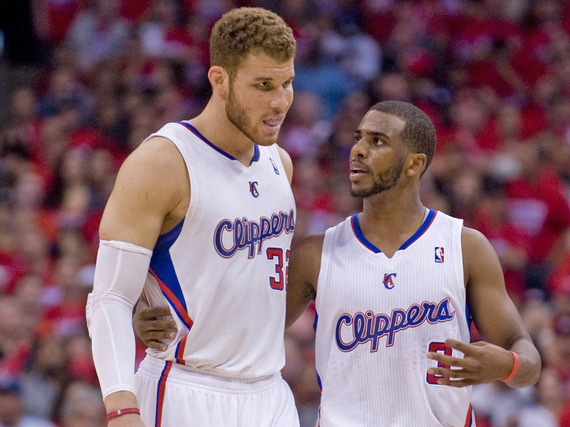After several months of melodramatic stand-offs, the $2 billion sale of the LA Clippers from super-rich Donald Sterling to super-rich Steve Ballmer finally closed this week.
No one with a heart should mourn the loss of Donald Sterling as an NBA owner. The old-school racism and plantation-owner attitude of this aging real estate mogul and former divorce lawyer has no place outside his Bat Cave. (But don't cry for The Don. After paying 20% capital gains taxes--assuming he can't offset his tax bill with a bunch of paper losses from his other businesses--The Don will have over $1.5 billion left to buy more Bat Caves and screw more tenants and mistresses.)
But no one with a head should celebrate the record-setting $2 billion price tag paid for the Clippers by former Microsoft CEO Steve Ballmer. Ordinary sports fans are likely to pay through the nose for billionaire Ballmer's extravagant new hobby.
Given the $2 billion price tag, Ballmer-Ball is likely to make decent Clipper tickets unaffordable to most middle class fans, raise concession prices to Michelin-rated restaurant levels, and force cable viewers to pay a substantial surcharge whether or not they ever watch a Clippers game (or alternatively, as with Time Warner and the Dodgers, leave a majority of fans with no TV access to Clipper games at all).
Take the Dodgers--please. Two years ago private equity fund Guggenheim Partners bought the Dodger for $2.3 million, the highest price ever paid for a US sports franchise, and $500 million more than the next highest bidder, a hedge fund manager. (As Andrew Ross Sorkin pointed out in The New York Times, the Guggenheim principles funded a substantial part of the purchase price for their new toy not from their own pockets but with money from insurance companies Guggenheim owns, some of which are state regulated and are supposed to invest their policyholders' money in simple and safe assets, not speculative sports teams. At least Ballmer had the cojones to use his own money to buy his new toy.)
So to help cover its exorbitant purchase price, the Guggenheim-owned Dodgers set up SportsNet LA to telecast Dodger games (and by nominally owning the network, tried to screw the other major league baseball teams out of their full share of revenue splitting from TV.) The channel is managed by Time Warner Cable which contracted to pay the Dodgers $8.35 billion for broadcast rights.
In turn, to cover its exorbitant license fee, Time Warner cable had to charge all its cable subscribers an extra $4.00 a month, whether or not they ever watch a Dodger game. This has been the basic model for powerful cable channel owners like Disney/ABC's ESPN--Force cable and satellite retailers to buy their channel for the retailers basic tier of service and charge all their customers the freight whether they want that specific channel or not. 80-year old grandmothers who watch, say, soaps and could care less about sports still have to pay for the sports channels.
The problem is that Direct TV and LA's other cable operators balked at Time Warner's price and refused to sign on unless Time Warner broke its business model and agreed to let them sell Dodger games to their customers on an a la carte basis (i.e. only those viewers who want the Dodgers would pay, but they would pay a substantially higher price since they wouldn't be subsidized by customers who didn't want the Dodgers). As a result of this impasse, 70% of LA-area cable and satellite subscribers can't watch Dodger games this season, even as the Dodgers make one of their best pennant runs in recent memory.
Steve Ballmer will almost certainly have to follow in the Dodgers footsteps to begin to cover his $2 billion purchase price for the Clippers. He'll need to raise the cost of tickets, parking and concessions to levels that will price most ordinary fans out of attending games in person, if they haven't been already. And if they want to watch the Clippers on TV, either all cable and satellite viewers will have to pay a surcharge on their monthly cable bill, whether or not they care about the Clippers; or Clippers fans will have to pay several hundred dollars a year to view Clippers games on TV on an a la carte basis.
Of course, with a reported net worth of $20 billion (maybe only $18 billion after shaking spare change out of his couch to pay for the Clippers), Ballmer could afford to operate the Clippers as a charity for the people of Los Angeles. He could give away thousands of tickets a game to inner city kids. He could have the players and coaches run free after-school programs that combine sports with reading and math. Or for the $2 billion Ballmer spent on the Clippers, he could pay the salary of every teacher in the LA school system for a year (which totals $1.989 billion).
But that's not the way of most of the super-rich. Instead, expect the people of Los Angeles to help subsidize Ballmer's new toy. And even if he loses a few shekels operating the Clippers, in 5 or 10 years when he becomes tired of owning a sports franchise, there'll always be another bored unemployed billionaire--say Mark Zuckerberg after he gets booted out of day-to-day Facebook management or Jamie Dimon after he gets booted out of day-to-day JP Morgan Chase management--who'll pay Ballmer $3 billion (i.e. a $1 billion profit) for the excitement of hanging out in a locker room with super-buff half-naked athletes, or joining the players at parties with half-naked supermodels.
Any way you cut it, though, the oligarchs will play and ordinary people will pay.

